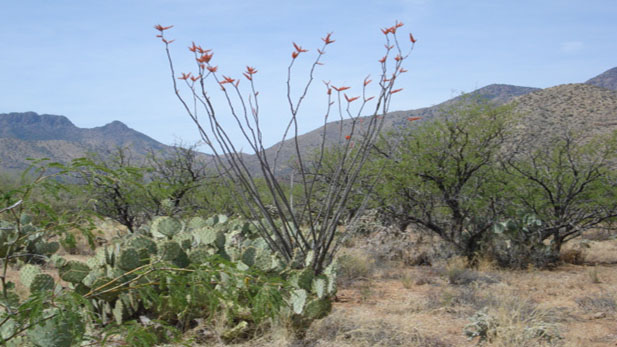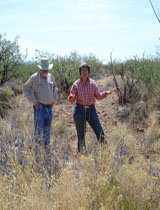 Residents say the Altar Valley Watershed is a unique area that ought to be used wisely and protected.
Residents say the Altar Valley Watershed is a unique area that ought to be used wisely and protected.Residents southwest of Tucson are working together to try to protect the Altar Valley Watershed, which is located about 20 miles away from the city and encompasses about 600,000 acres.
A coalition of different groups established the Altar Valley Conservation Alliance in 1995 and it became a formal non-profit organization in 2000.
The valley is home to the small communities of Three Points, Arivaca and Sasabe, but it is better known for its working cattle ranches, Buenos Aires National Wildlife Refuge and other wide open spaces.
 Tom Sheridan and Mary Miller are some of the many volunteers who are working to help protect the Altar Valley Watershed.
Tom Sheridan and Mary Miller are some of the many volunteers who are working to help protect the Altar Valley Watershed.In the 1990s, many of the people who live in the watershed were concerned about Tucson's encroaching growth from the east. They also wanted to help the land by bringing back fires and mitigating the damage from the roads that have been built there. The pathways change the direction of the water flow, increase soil erosion and reduce native vegetation.
Mary Miller's family moved to Altar Valley in the 1940s and they operate Elkhorn Ranch, a guest ranch that also keeps horses and leads trail rides.
“You lose your water, you lose your soil, really you’re sunk. You don’t have your basic building blocks anymore," she says. "It’s very important to many of us because we live and work here. Many of us have ranched in this valley for generations."
 Volunteers are placing rocks in gullies to slow down the water flow, reduce erosion, and help plants get established.
Volunteers are placing rocks in gullies to slow down the water flow, reduce erosion, and help plants get established.University of Arizona professor Tom Sheridan moved to the watershed in the 1980s with his wife and he's a volunteer with the organization. One of the hands-on projects by volunteers is lining up water channels to slow down the water flow, preserve soil and provide an area where desirable plants can grow.
“What the alliance is trying to do is realize John Wesley Powell’s original vision for the West, which is a West that is composed of watersheds. And what we’re trying to do is stitch this watershed back together, to bring all the different private land owners, federal agencies, state trust lands, environmental groups, and get them all working together to restore the health of this valley as a whole," he says.
"It becomes a very fertile place for great thinking, great collaborative work and learning," adds Mary Miller. The future, members say, is dependent on the actions taken now.

By submitting your comments, you hereby give AZPM the right to post your comments and potentially use them in any other form of media operated by this institution.